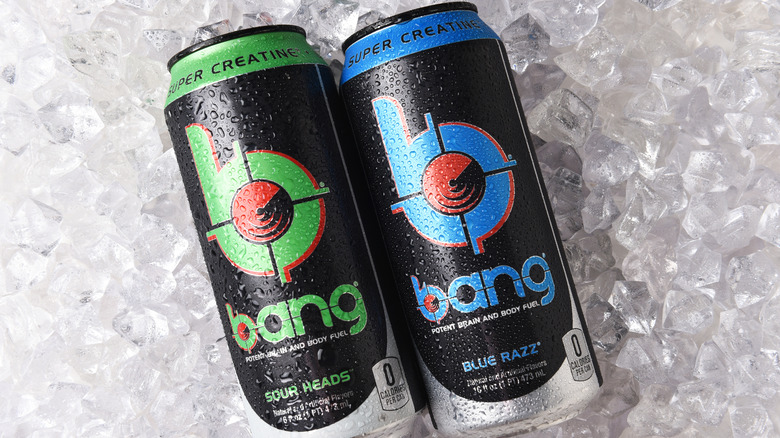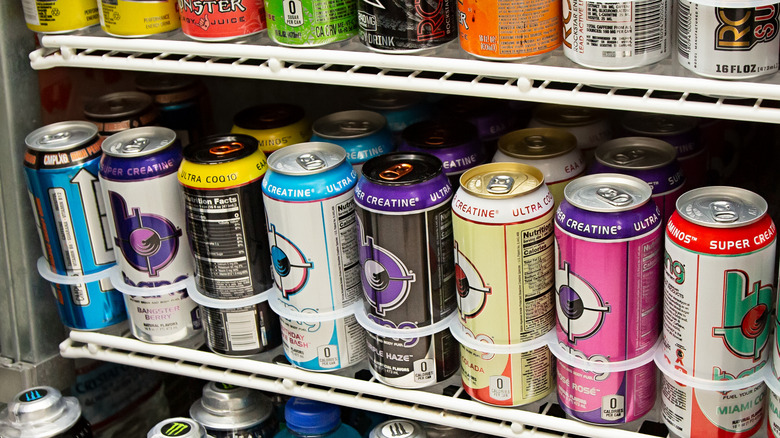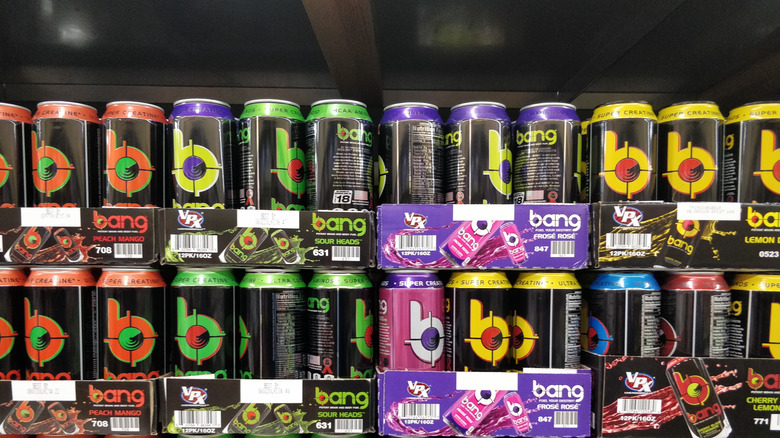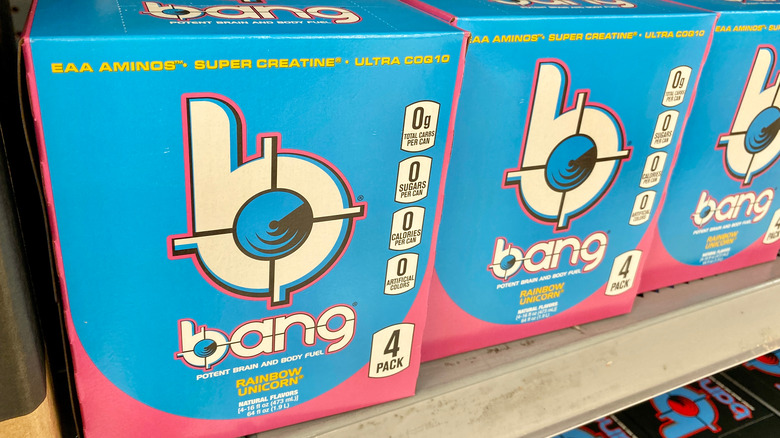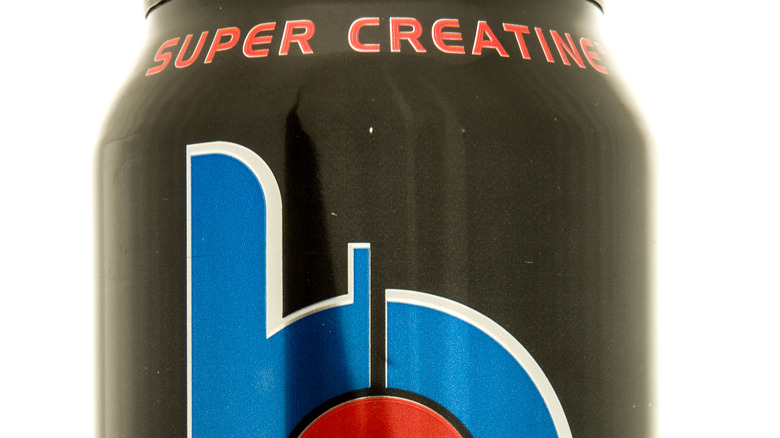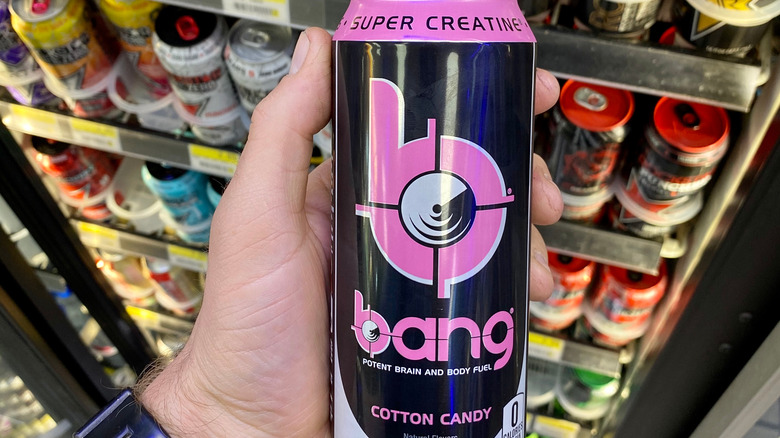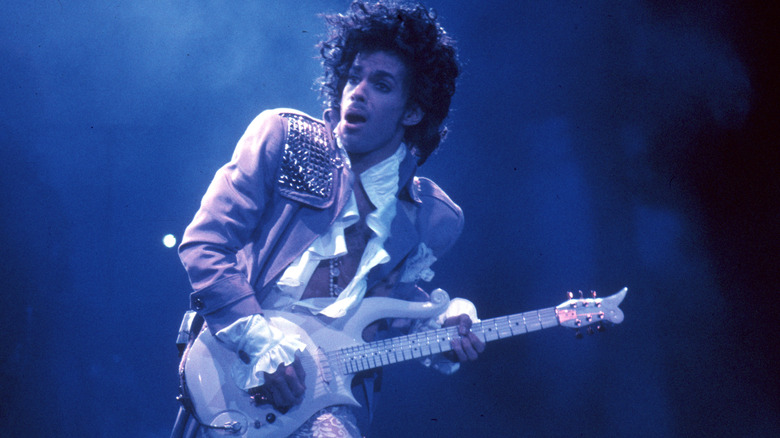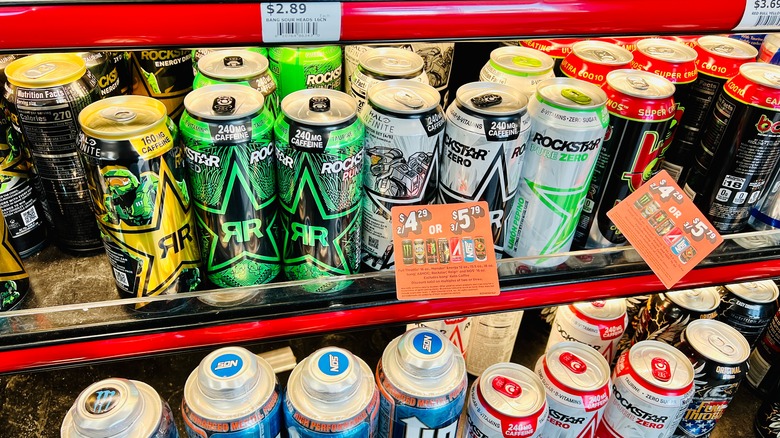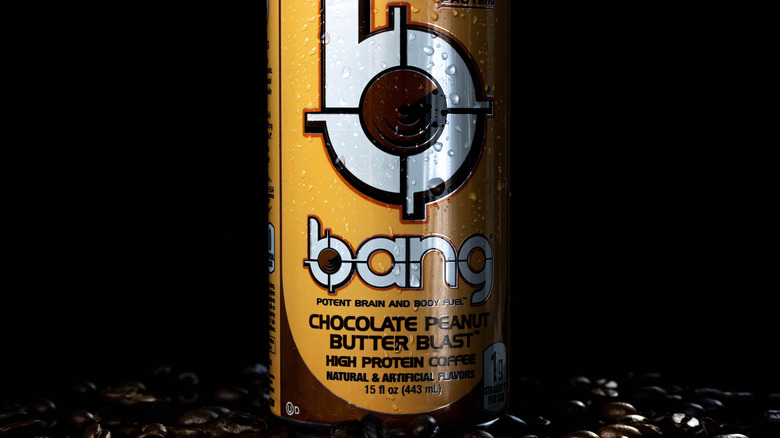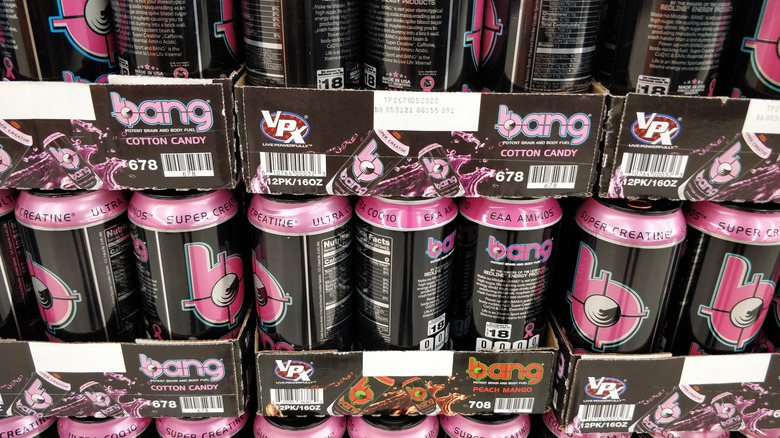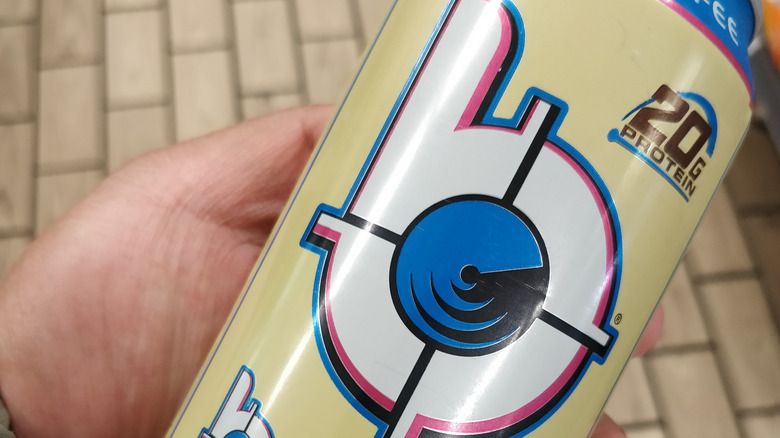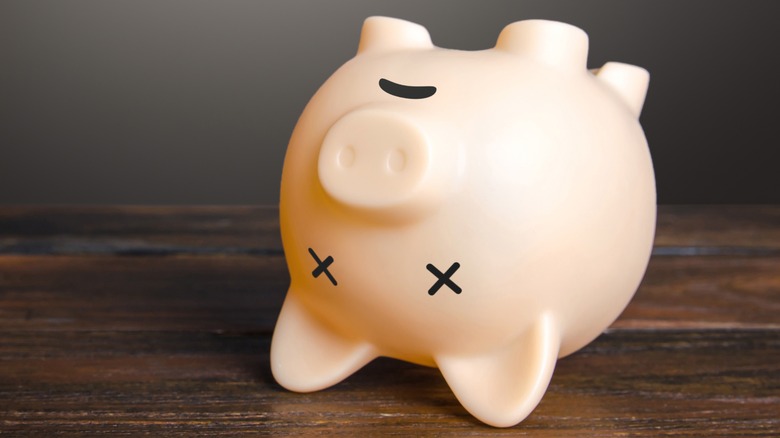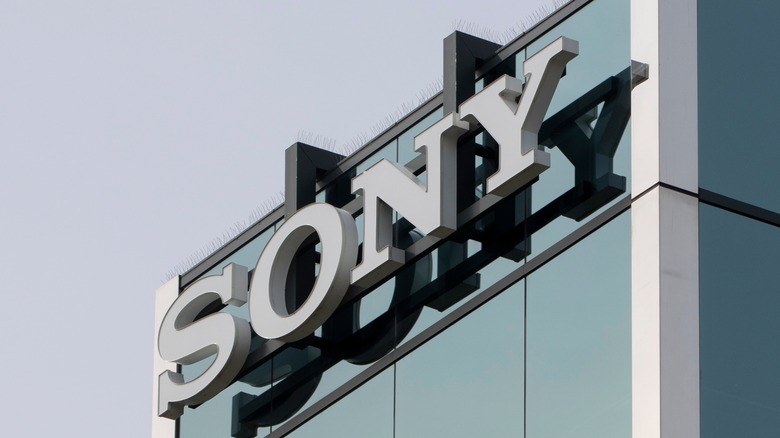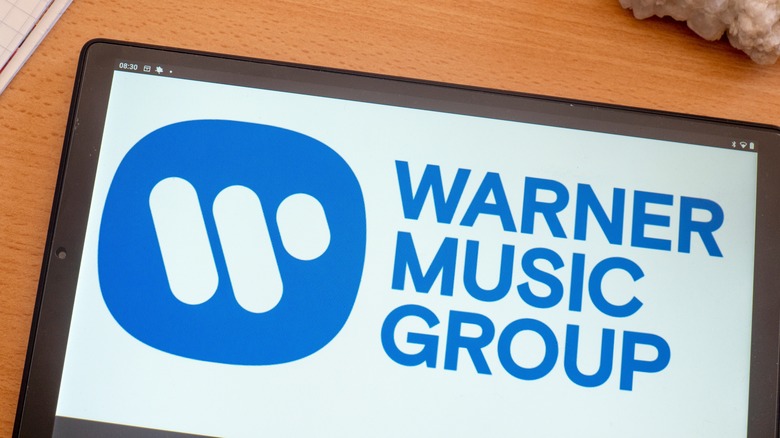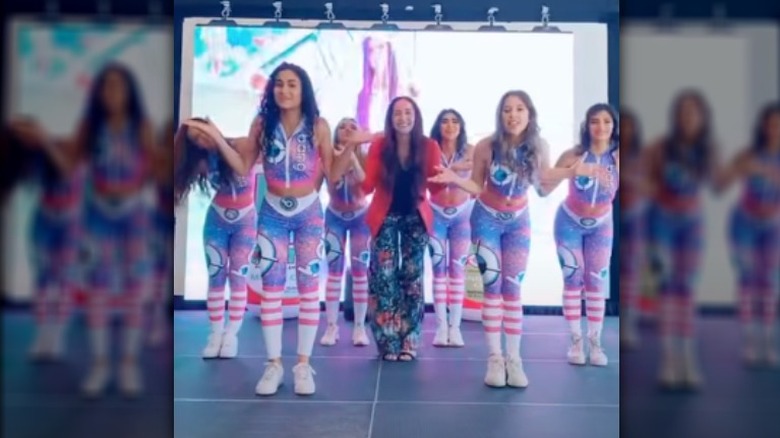Bang: All The Details Behind The Popular Energy Drink
Everyone has their preferences when it comes to caffeinated beverages. While the options used to be mostly just coffee or tea, today there are countless different options to quench your thirst and deliver a nice caffeine boost.
If you've got a tween in your house, spend any time on TikTok, or happen to be a fan of energy drinks, chances are you've heard of Bang. Bang Energy drinks haven't been around for as long as competitors like Monster, but in just a decade they've made quite a name for themselves.
For those who are unfamiliar, allow us to fill you in. Bang Energy has quickly caught up to established names in the energy-drink space thanks to its colorful cans and zany flavors. As of 2021, it was the third best-selling energy drink brand in the U.S. according to Caffeine Informer. Bang isn't just flashy; it's also unique in its composition. Bang is packed with ingredients that not only provide energy but also help with muscle-building and deliver nutrients needed for your body to perform at its best (or at least that's what the brand claims; as we'll get into, there's some controversy about this point).
The work behind Bang first began in 1993
The road to Bang Energy drinks began when parent company Vital Pharmaceuticals, also known as VPX Sports, was founded by Jack Owoc in 1993 (per PR Newswire). His vision was to create a sports-supplement company that delivered safe, quality products that brought scientifically backed results.
"I took decisive action using intensive scientific research and development to innovate and create supplements that yielded extreme efficacy and impeccable purity –- to create a sports and performance nutrition company that tested and set the highest standards for quality," Owoc shares on the company's website. "I declared and committed to deliver super-premium quality sports and performance nutrition products backed by evidence-based scientific research."
From there, development on Bang began. According to The Silicon Review, the brand was incorporated in 1996. Jack Owoc told the publication that he wanted his business to be more like "a pharmaceutical company, not a supplement company." One way Bang accomplishes this is by testing all the ingredients it receives before using them in beverages.
The first Bang Energy drinks hit store shelves in 2012
Although VPX had been around since the '90s, Bang Energy drinks weren't released to the public until late 2012 (via New Hope Network). The drinks were different than others on the market for a number of reasons. Their flashy packaging was reminiscent of competitors like Monster or Rockstar, but the drink inside the can contained several novel ingredients.
Founder Jack Owoc hoped to change the market with a drink that he claimed delivered a boost of energy without the unhealthy crash that came from drinks loaded with sugar. "I was unhappy with the beverage category and wanted to create a unique carbonated beverage that was health promoting, not health destroying," he explained in a press release published on BevNet. "Bang optimizes synergistic ingredients for energy, not just an immediate effect. Bang [is] unlike any carbonated beverage on the market because it's sugar-free, calorie-free, and contains no artificial ingredients."
It took a while for Bang to attain the popularity the energy-drink brand has today, but by the end of the decade, the company was well on its way after experiencing growth of 80% from 2019 to 2020, according to Caffeine Informer. With a boost in consumers, some cannot help but wonder if Bang Energy drinks are bad for you or if the brand is really onto something.
Bang has a wild amount of caffeine
It wouldn't be an energy drink without delivering some serious energy, and Bang definitely doesn't disappoint. Per Bang's website, every 16-ounce can delivers 300 milligrams of caffeine. To put that in perspective, that's nearly double the amount of caffeine in the same size can of Monster, which has 160 milligrams of caffeine (via Monster Energy).
Bang's sugar-free, zero-calorie formula aims at bringing that extra energy without a serious crash afterward or any negative dietary effects, and the brand's founder told The Silicon Review that "The prodigious amounts of caffeine in Bang Energy drinks can be great for vitality, mental focus, and even weight loss." However, he qualified that statement with the warning that "there is also a point when caffeine intake becomes too much."
Owoc also noted that 400 milligrams of caffeine is the upper limit that the FDA recommends per day, which we confirmed on the agency's website. That is why Bang is not recommended to be used alongside other caffeine products. In addition, he pointed to caffeine-free Bang as an option for those who are concerned about their caffeine consumption.
Creatine sets it apart from many competitors
After caffeine, super creatine is the next thing that helps Bang stand out in a crowded energy drink market. Specifically, the brand uses a proprietary product it calls "super creatine," which it claims is a water-soluble creatine-amino acid peptide. The creatine is bonded to L-Leucine, which is a type of amino acid that builds proteins within your body (via Total Shape).
The creatine used in Bang is not FDA-certified, and the writer at Total Shape notes that Bang doesn't list the super creatine content in each can. Healthline says that the safe amount for daily consumption is between 3 grams and 5 grams daily. It's unclear whether or not Bang's creatine content falls within this safe window.
There's some controversy over whether Bang actually contains creatine at all. Bang is the subject of a lawsuit over its creatine claims. The suit alleges that there is little to no actual creatine in the beverage, according to ClassAction.org.
There are side effects to regularly drinking Bang Energy drinks
While Bang claims its energy drinks are healthy (or at least healthier than other energy drinks), they're still addictive. Bang has no sugar and less caffeine than some energy drinks, but it still has plenty of ingredients with potentially dangerous side effects (via Illuminate Labs). When you drink energy drinks every day, you are more likely to develop medical problems.
The company is being sued over claims of deceptive labeling related to too-low levels of creatine, Coenzyme Q10, or branched-chain amino acids to be beneficial (via Class Action). So, there's probably no reason to worry about their side effects. However, Bang Energy has 300 mg of caffeine, which is just 100 mg shy of the FDA daily limit. Drinking more than one Bang Energy a day can increase your heart rate and cause everything from insomnia to headaches.
Other ingredients could pose even more problems. While sodium benzoate has some health benefits, it has also been linked to inflammation and attention deficit hyperactivity disorder (via Healthline). Sucralose (Splenda) may increase inflammation, which could lead to obesity and diabetes over time (via WebMD). Potassium phosphate dibasic can cause digestive problems (via RXList). Calcium chloride may result in low magnesium and blood phosphate levels, low blood pressure, kidney stones, hot flashes, nausea, and fainting. Consuming too much at once can cause irregular or slow heartbeats (via RXList). Meanwhile, calcium disodium EDTA may cause digestive problems if too much gets ingested (via Healthline).
Bang has a wide variety of interesting flavors
Part of the draw of Bang Energy drinks, especially to younger audiences, is the variety of interesting flavors they are available in. As of early 2022, there are over 30 flavors of Bang Energy drinks listed on the brand's website. The flavors have fun, zany names, such as Rainbow Unicorn, Radical Skadattle, and Bangster Berry. They may not always give away what the drink will taste like, but the catchy names and each flavor's unique can design help consumers identify their favorites more easily.
Fans are passionate about which flavors are their favorites. One Redditor even rated all the flavors in a tier system, with Radical Skadattle, Purple Kiddles, and Cherry Blade Lemonade as 10/10 picks. On the other end of the spectrum, Miami Cola was the lowest rated, which a number of commenters disputed. We also have our own ranking of Bang flavors if you don't trust the opinions of one anonymous Redditor. The wide spectrum of flavors ensures that Bang fans never have to get tired of drinking the same thing over and over again.
Prince's estate blocks Bang Energy's Purple Rain trademark
When you think of the phrase "Purple Rain," one of three things probably comes to mind — Prince's 1984 album, his song of the same name, or his movie "Purple Rain." Yet Bang Energy applied for a trademark to use the name "Purple Rain" on a flavor of energy drinks and supplements. Not surprisingly, Prince's estate moved to block the application.
According to Digital Music News, "Prince's estate noted in their argument that 'Purple Rain' is not a phrase that is commonly used to refer to anything other than Prince's song or his film of the same name." The estate submitted results of a double-blind survey, showing that about 63% of respondents connected the phrase "Purple Rain" with Prince. The estate's attorney, Londell McMillan, told Billboard, "Prince's music, art, and trademarks hold a special place in our society and culture. Purple Rain is a Prince mark and brand known worldwide. Please respect these unique assets or suffer at your own peril."
A board with the U.S. Patent and Trademark Office ultimately rejected Bang Energy's request to trademark "Purple Rain" on August 23, 2022. CEO Jack Owoc said after the ruling, "We greatly respect Prince and his estate and will not 'rain' on their parade. Maybe we can negotiate a deal in the future that is mutually beneficial to both parties" (via Billboard). Considering the case, we're guessing Prince's estate won't be interested in any future collaborations.
Bang has experienced a lot of growth since 2019
Bang energy drinks enjoyed 80% growth from 2019 to 2020, selling $780 million worth of energy drinks in the year leading up to the pandemic (via Beverage Industry).
Bang also experienced serious growth in its energy-shot business that year. After failing to crack the top 10 in 2019, Bang energy-shots sales grew by 438.6%, earning $10.7 million in 2020. That made Bang No. 5 in that category for the year.
Performance energy drinks experienced significant growth from 2020 to 2021. Bang's sales continued to grow, and the company held its No. 3 spot on the best-selling energy drink list behind Red Bull and Monster. The energy-drink market as a whole grew that year, despite the drop in convenience-store business due to the pandemic. Bang's $1.2 billion in sales for the 52 weeks ending in June 13, 2021 marked a 9.1% increase over the same period the year prior, according to Beverage Industry.
Bang makes more than just energy drinks
Bang is big in the energy-drink business, but that's not all the company has to offer. Aside from Bang energy drinks, which come in classic and caffeine-free varieties, the company's website also lists Bang energy shots, Bang pre-workout, Bang keto coffee, Bang sweet tea, a Bang fat burner, and Bang hard seltzer.
At the time of writing, Bang energy shots are available in 14 different flavors. The pre-workout is available in three different varieties, two of which are caffeine-free. The keto coffee is available in three different varieties, as is the sweet tea.
There is also a line of Bang 5% nicotine vapes that use similar branding and logo design to VPX's Bang products (via West Coast Vape Supply). It's unclear if these are actually made by the same company as the energy drinks, however, as they are not listed on Bang's website, and a vape product doesn't seem like a natural fit for a brand that prides itself on health claims.
Bang is in a number of legal battles
As Bang energy drinks get bigger and bigger, they are attracting a number of legal battles. Bang was the receiving end of a lawsuit from competitor Monster, according to the Los Angeles Times. Monster's 2019 lawsuit accused Bang of "flagrant consumer deception and systematic anti-competitive business practices" as well as "deceiving the public about the product's ingredients and the benefits of consumption." Monster's suit claimed that super creatine was basically fake, and also that Bang stole proprietary information from Monster by hiring former Monster employees. This came on the heals of the class-action suit we mentioned above that alleged that Bang did not contain the amount of certain ingredients that it specified (via ClassAction.org).
Bang also leveled a lawsuit of its own in 2020. The company filed a lawsuit against distributor PepsiCo, who the brand signed with earlier the same year. Per Food Dive, Bang claims that Pepsi "has falsely represented to independent distributors and retailers that PepsiCo is Bang's exclusive distributor." The suit additionally claims that Pepsi used intimidation tactics to get major retailers to purchase their supply of Bang exclusively through Pepsi.
Bang is a hit with the TikTok crowd, but the platform led to some trouble
Bang Energy's unique products set the brand apart, and the company's social-media presence is also built differently from the competition. Notably, Bang went all-in on TikTok, joining the creator-friendly space in 2019. One of Bang's early TikTok experiments was sponsoring a Floridian TikTok creator graffiti house. Local content creators came together at the home and let their creative energy flow, fueled in part by Bang.
Bang's work with influencers has led to partnerships with some of TikTok's biggest rising talents, including Tony Lopez, Alex Warren, Bryce Hall, and Sam Pepper. Often, these creators are just doing their own thing, making their usual content, but with an ever-present can of the energy drink in frame. By not forcing any specifics on these creators, Bang's content feels more natural than other sponsored content.
Bang Energy's parent company filed for bankruptcy
On the same day that Bang Energy celebrated its 10th birthday in October 2022, billionaire Jack Owoc signed bankruptcy papers for the energy drink's parent company, Vital Pharmaceuticals Inc. According to Bloomberg, the bankruptcy comes on the heels of the need to pay legal damages, a deal that fell apart with Pepsi, its former distributor, and a drop in Bang Energy drink sales.
The company owes $293 million to rival energy-drink company, Monster, over false advertising claims and another $175 million in damages from a separate case involving Monster and juice company Orange Bang for breach of contract and trademark infringement, Bloomberg reported. Vital Pharmaceuticals owes another $115 million to Pepsi for ending its distribution agreement early. Sales have also dipped as Bang Energy's share of the energy-drink market dropped from about 10% to just above 6%. One reason is that there are far more "good-for-you" brands available in stores than there were when Bang first became popular, according to Bloomberg.
In March 2022, Vital Pharmaceuticals defaulted on several hundred million dollars worth of debt. While Bang Energy has a new distribution network and lenders willing to front the company $100 million, it still owes $340 million to other lenders. Bankruptcy papers indicate that Owac may have to sell the company if he can't refinance all the debt by the last part of January 2023.
Bang Energy also faces a lawsuit from Sony Music
Most companies realize that they shouldn't use songs without paying for the rights to use them, but not Bang Energy. Somehow, company officials thought that advertising on TikTok and other social-media platforms exempted them from having to pay to license the music they used. According to a complaint Sony filed in August 2021, Bang used at least 132 songs copyrighted by Sony in at least 209 videos in its social-media posts. These songs include Michael Posner's "Please Don't Go," Michael Jackson's "Bad," and others. The claim says that Bang's TikTok, Instagram, and Facebook accounts, along with CEO Jack Owok's accounts, have over 11.57 million followers and likes combined. Meanwhile, the #bangenergy and #bangenergydrink hashtags have over 14.14 billion views across the platforms, the filing reported.
On September 14, 2022, U.S. District Judge William Dimitrouleas ruled that it was "undisputed" that Bang Energy's parent company, "Vital Pharmaceuticals had directly and vicariously infringed Sony's sound recordings" (via Mondaq). The judge "rejected Bang's fair-use defense and its argument that Sony Music was not entitled to actual damages or lost profits" (via Reuters). The same judge made a similar ruling in July concerning Bang Energy's use of copyrighted songs from Universal Music Group in social-media ads. Any damages Bang ultimately ends up paying certainly won't help the company as it faces bankruptcy related to other issues (via Bloomberg).
Warner Music Group is the most recent record label to sue Bang Energy
If you're a music label wanting to sue Bang Energy over copyright infringement, you'd better get in line. Universal Music Group (UMG) was the first. Sony followed with its own lawsuit, and now Warner Music Group is getting in on the action.
Warner Music Group entered its complaint against Bang Energy on September 15, 2022, the day after a U.S. District Court judge ruled in favor of Sony. Warner claims Bang Energy has used nearly 200 musical recordings from its label in social-media ad campaigns. The ads include copyrighted music from artists like Bruno Mars, Dua Lipa, Lizzo, Van Halen, and others. In addition to posting these ads on its own social-media accounts, Bang Energy has compensated social-media influencers for creating and posting the videos on their own accounts, Warner states.
In its complaint Warner says that Bang has "achieved net sales of approximately $2.37 billion and gross profits of approximately $1.3 billion between 2017 and 2021 (over half of which has been achieved since early 2020)." Ultimately, Warner attributes these record sales to the millions of social-media followers who have watched, liked, and shared Bang Energy's posts billions of times. Not once has Bang paid for permission to use Warner Music Group's copyrighted songs, the complaint states. Like the other labels who have sued, Warner is asking Bang Energy to stop using its music in ads and compensate Warner for previous music usage.
Some people were not happy with Bang's behavior during the pandemic
Bang Energy's marketers have been on fire in recent years, utilizing social-media ads to increase the brand's popularity. There have been billions of views, likes, and shares of videos with Bang-related hashtags on social media, translating to record profits (via Digital Music). With such success, Bang apparently wasn't going to let something like a worldwide pandemic slow it down. During the COVID-19 lockdown, Bang threw a dance party at its Pembroke Pines, Florida, headquarters to celebrate the launch of its new drink, Noo-Fusion.
The company would not allow employees to work from home during those earliest, most uncertain days of the pandemic. On March 18, 2020, Bang reportedly required employees to attend the Noo-Fusion launch and dance party, despite the Florida State Health Department asking residents to stay home and stay away from crowds. According to comments on a YouTube video from the event, Broward County, Florida, where Bang held the product launch, had the highest number of COVID-19 cases in the state at the time. Event videos show about 100 employees dancing around or sitting in close proximity to each other. A Bang employee told Vice, "It was either get corona and be potentially exposed or lose our jobs. ... It could have been sent in an email, considering half of his employees were scared to be there. The more we complained, the more [CEO Jack Owoc] wanted to move forward with the event, despite concerns."
